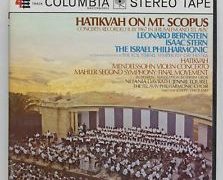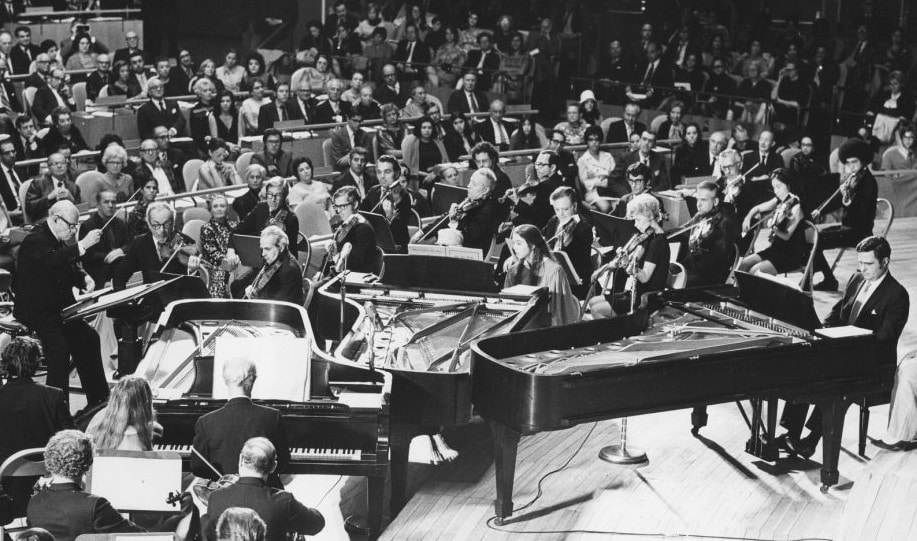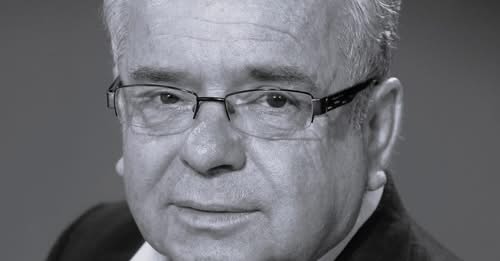Bernstein and Stern play the 1967 Jerusalem victory concert
mainEveryone listened to this on the radio – there was no television in June 1967.
I was unaware until now that footage existed.

Everyone listened to this on the radio – there was no television in June 1967.
I was unaware until now that footage existed.
We’ve been given to understand that tonight’s Lebrecht…

Pablo Casals conducts a gloriously old-fashioned 1971 performance…

From the last Lebrecht Album of the Week…

Jiří Pánek, who died on December 19 aged…

Session expired
Please log in again. The login page will open in a new tab. After logging in you can close it and return to this page.
…and here you can find the entire documentation about Bernstein’s and Stern’s trip to Jerusalem in 1967 (unfortunately in low quality and wrong 16:9 ratio):
https://youtu.be/ES8-8dXxlWs
Thanks Patrick! This document is a true gift!!
There is also a more extended documentary that someone has posted on YouTube: https://www.youtube.com/watch?v=ES8-8dXxlWs
The Columbia lp that was released at the time of the Mt Scopus concert with Mahler 2 in Hebrew is a bit of a con because the Mahler and Mendelssohn concerto with Stern were not recorded at the actual open air concert on Mt Scopus.
Thank you for the link.
Around 30′ there is footage of a remarkably musical 12 year old boy playing and singing for Bernstein and Stern. Does anyone know who the boy and what happened to him later?
His name is Daniel Oren and today he is a very successful opera conductor
Wow, of course I’ve heard of Daniel Oren. That young boy richly deserved a great career. He already knew a thing or two about melodic singing at 12.
OMG, this is such a touching time capsule. Watch Lenny around 5′, what he says and then when he leaves the wall his expression, what he doesn’t say, what can’t be said. Does anyone have any doubts where this man’s heart was? In the right place. It’s a shame the subtitles are only in English, there is so much here, but I don’t know how much of it is meaningful outside the tribe.
Like every other Israeli, I made that trip right after the war. We spent the 6 days of the war cooped in shelters, waiting for the second holocaust to come, together with our parents, survivors of the first, and then suddenly – this? So there was an understandable euphoria. Do we need to apologize for any of this? It reminds me of a title of a feuilleton by the humorist Efraim Kishon that captured Israelis’ reaction to the reaction of the world to the Arabs’ defeat “slikha shenitsakhnu” – I suppose you can translate it: pardon-us for our victory.
And so they played the concerto by Mendelssohn. A devoted Lutheran, the reviver of Bach’s St.Matthew Passion, with a Jewish family history.
In Jerusalem, the city of many faiths and cultures.
May this be testament and encouragement, that as humanity our prosperity lies in peaceful collaboration and tolerance between the cultures and religions, not in divisiveness and intolerance or even racism or religious supremacist ideologies.
Amen.
The constitutions, at least those of western countries, generally have it right. Politicians and some of the people are another matter.
You do know that Britain has no constitution?
My high-school English teacher, a Briton, responded to my similar comment by saying, “Of course England has a constitution. It’s an unwritten one.” In other words, its government is constituted according to a variety of documents and legislative acts (as well as traditions) that have accumulated over centuries of practice. What do you think the term “constitutional monarchy” refers to?
It is important to recognize some fundamental differences between the British (unwritten) constitution and the American (written) one. Perhaps foremost is that, in England, Parliament is sovereign, and can therefore change the constitution (as well as control the succession); in the United States, sovereignty rests in the people (not the Congress, nor any other part of the Federal government), and the Federal government was created by the Constitution — it is not a party to the Constitution and cannot alter it through legislation.
A major difference between written and unwritten constitutions is that written ones provide a point of reference that allows for judicial review of legislation. If a legislature can change the powers and organization of government by legislation, then there is no possibility of a court saying that a particular law is invalid because it violates the constitution.
That doesn’t mean there is no constitution at all.
Mark writes: “the Federal government … cannot alter it through legislation.”
Er…yes it can. There are quite a few amendments to the US constitution (e.g. first amendment, second amendment, etc).
Mark also writes: “A major difference between written and unwritten constitutions is that [unwritten constitution means] there is no possibility of a court saying that a particular law is invalid because it violates the constitution.”
Er…no, this is wrong. The applications of laws can be challenged, and often are, through the courts in England, as they are elsewhere.
Lastly, all countries operate on a mixture of explicitly stated rules and unwritten but understood rules. The former can be in the form of a single constitutional document or (as in Britain) a series of different documents. Interestingly, many of these documents (Magna Carta, Act of Settlement etc) are also binding in the US.
Congress cannot change the US Constitution by legislation. It can propose changes; 3/4 of the States must ratify for the changes to take effect (as amendments), because the Federal government was created by the States when their citizens ratified the Constitution. The States have amended our Constitution.
And, yes, the application of a law — i.e., its interpretation — can be challenged even without a written constitution — but that is a far different thing from saying that a legislature had no authority to pass that law in the first place. Judicial review, in that sense, has been part of the US Constitution from the beginning (see Marbury vs Madison, which laid out the basis for such review); if it exists in England it is only a recent practicality.
Lenny conducting with a cigarette in his left hand! Love it!
One wonders about the ambiguous nature of Lenny’s comment: “This city should become a model of the whole world. Why not? It is no ordinary city, this is Jerusalem, the very center of faith. Let it spread, let the walls come down.”
Was it intentional that he didn’t mention a specific faith? And what does he mean when he says “let the walls come down”? His carefully read statement is a masterpiece of diplomatic ambiguity. Whatever, 50 years after the war, the occupation is still not recognized by the world, and the walls dividing two of the city’s faiths are worse than ever.
And of course, about 40 years later a wall was literally constructed.
One might also see Bernstein’s statement in the context of his Mass composed 4 years later. Its themes center around peace and ecumenicism — similar to the idea that Jerusalem would be the model for a new world of pluralism, tolerance, and cooperation. Ancient history in the world of hate we live in now. Why did people such as Bernstein and Shimon Perez fail, and people like Netanjahu and Trump rise? The failure of Bernstein’s mass was symbolic of the failure of many other things as well. When we can’t find truth and hope in art, we can’t find it at all.
Peace through strength. Weakness does not beget peace.
We’ve seen much strength, little peace.
War is peace, freedom is slavery, ignorance is strength.
The wailing wall falls a part-recently huge stone came out- no injured.
I viewed this concert in the States in the cinema. It was incredibly moving. At 15, it was my first time hearing the Mendelssohn Violin Concerto, at the Tzofim amphitheater in Yerushalayim.
I am not Jewish, but am certainly most sympathetic to Jews for their plights over the centuries and especially under nazi Germany.
The deeply felt performance of Hatikvah is very moving, especially when combined with the visual footage of this video: a proud nation after a military triumph, celebrating with art of the highest level.
And then I looked at the estimated casualties of the Six Day War: Egypt 11,500, Syria 1,000, Jordan 6,094, Israel 777.
http://articles.latimes.com/1991-03-08/news/mn-2592_1_civil-war
I need to do a lot more reading to understand to what all that extent those casualties could be justified and how one could celebrate for anything other than the end of a war. Recommendations will be appreciated.
Israel started 6-day war, show the military superiority and occupied more land. They only return Sinai and Gaza strip. It was unprovoked aggression, so this big casualties in neighbor countries.
There’s another view of this issue buried in this item about Evgeny Kissin:
‘The Western establishment is betraying its values’: Evgeny Kissin interview
The child prodigy and piano virtuoso has always divided critics. But his defence of Brexit and Israel may prove his gravest heresy yet
Damian Thompson
17 June 2017
Is Evgeny Kissin, born in Moscow in 1971, the most famous concert pianist in the world? Probably not, if you stretch the definition of ‘concert pianist’ to encompass the circus antics of Lang Lang, the 34-year-old Chinese virtuoso who — in the words of a lesser-known but outstandingly gifted colleague — ‘can play well but chooses not to’.
But you could certainly argue that Kissin has been the world’s most enigmatic great pianist since the death of Sviatoslav Richter in 1997 – though, unlike the promiscuously gay Richter, his overwhelming concern with privacy does not conceal any exotic secrets. He has recently married for the first time, but chooses not to publicise the fact. I don’t see why I should name his bride, since he hasn’t, but it was obvious when I met him last week that he’s very happy.
No one close to Kissin will have been surprised that details of his romantic life are entirely missing from his Memoirs and Reflections, just published by Weidenfeld and Nicolson. The book is a mere 190 pages long and that includes a ‘select discography’ from which key recordings have been omitted — for example, the Mozart D minor concerto K466 that Kissin directed from the keyboard with the Kremerata Baltica in 2010. It’s the most gloriously full-bodied performance — powerful, delicate, with legato arches that could hold up a Bruckner symphony. To anyone who thinks Kissin did his best work as a wunderkind, I’d say: listen to this.
On the other hand, no one can forget that he was a prodigy, and nor should they: at the age of 12, he produced a recording of the Chopin piano concertos that still rivals the finest in the catalogue. In his mid-twenties he gave the first ever solo piano recital at the Proms. Not one of the hundreds of juvenile virtuosos from the Far Eastern piano factories has come close to equalling his achievement.
Although there are many things missing from Memoirs and Reflections, it’s also revealing. Kissin is still only 45, looks younger, and yet recorded Tchaikovsky’s First Piano Concerto with Herbert von Karajan. The maestro had decided that he wanted this warhorse to amble along. Kissin was told that he ‘must not race’, or Karajan would hold back even further. ‘The result was a vicious circle,’ writes Kissin — though in the end he concluded that ‘Karajan filled these tempi with all the forces of his genius’. Critics didn’t agree.
Stories like this suggest that the teenage Kissin was as comprehensively trapped as any pianistic prodigy in musical history. Philips made him one of the 100 ‘Great Pianists of the 20th Century’ before he turned 30. Society hostesses treated themselves to another facelift in the hope of seducing him. ‘He inspires adulation so irrational that it defies analysis’, wrote Stephen Wegler in International Piano magazine in 2004. Yet, he added, no pianist of his calibre received reviews that were ‘so personally nasty, even malicious … Because his curly hair tends to rise into a beehive. American critics seem particularly fond of comparisons with Elsa Lanchester’s grotesque appearance in Bride of Frankenstein.’ Kissin’s book hints that these were disorientating and suffocating years. Yet, it must be said, he can also dish it out. For example, he writes that he finds something ‘blasphemous’ in the way Josef Hofmann and Vladimir Horowitz approached certain works of Chopin.
Memoirs and Reflections is ‘compiled and edited’ by Marina Arshinova and translated by Arnold McMillin. So it’s a transcript of interviews, which is fair enough — but after talking to him for over an hour in the Spectator offices I’d say the last thing Evgeny Kissin needs is a translator.
His English is immaculate. You get the impression that a mixed-up tense annoys him as much as a dropped note in the whirlwind finale of Schumann’s Carnaval. Both things happen, but very rarely.
Kissin tends to pause for a long time before answering a question. I thought at first that he was tidying up his English in advance — but, actually, the extreme precision is necessary because he’s moving through a political minefield. No one asked him to enter it, but he feels he has no choice.
We’re not talking about musical politics here, but actual politics. And it’s a minefield because Kissin despises the soft-left consensus embraced by artistic aristocracy.
‘I am a staunch supporter of Western values,’ he says, ‘but in recent years I began to realise that unfortunately the Western establishment was often betraying those values. And one of the manifestations of such betrayal was its anti-Israel stance.’
In 2009, Kissin wrote to the BBC’s then director-general, Mark Thompson, accusing the corporation’s Persian service of perpetuating the ‘blood libel’ by reporting that Israel was harvesting the organs of dead Palestinians. What response did he get? ‘A letter trying to get out of it.’
Kissin describes himself as an Israeli-Russian-British citizen. The Israeli passport is the most recent — he took citizenship in 2013 — and apparently the one he values most.
He has celebrated his Jewish identity since his Russian childhood, ‘when amongst the people the word “Jew” was perceived as slightly indecent and better avoided’. As a young man he taught himself Yiddish and has recorded several CDs in which he recites Yiddish poetry.
His journey to becoming ‘a soldier for Israel’, however, was a long one — and inspired by the writings of a non-Jew, Vladimir Bukovsky. In 1994, the former Soviet dissident published a book called Judgment in Moscow. ‘For me it was a revelation, not because it exposed numerous communist crimes — these were no secret to me — but because it exposed how corrupt the Western establishment had been for many decades.’
Bukovsky’s book has never been published in English — ‘but I have it in my archive,’ says Kissin, and starts reading from his mobile phone. He chooses a passage in which Bukovsky says that ‘if you have the guts to keep killing people for long enough… then you are no longer a terrorist but a statesman and Nobel Peace Prize winner. This will not remain unnoticed by Hamas, nor the IRA…’
At which point, given that we were two days away from the general election, I couldn’t resist mentioning Jeremy Corbyn.
‘My late uncle, Lord Kissin, must be turning in his grave,’ he says. Harry Kissin, a prominent Labour supporter and refugee from the Nazis, helped secure permanent UK residency for the pianist and his family, plus his beloved teacher Anna Kantor, now in her 90s.
I wondered what Evgeny Kissin made of the European Union that Bukovsky detests.
‘I certainly don’t like what has become of it,’ he says. ‘Having grown up in the former Soviet Union I am for the independence of states. A common market is one thing but political centralisation is something completely different which I do not like.’ So he doesn’t blame Britain for voting to leave? ‘No. We’ll see what the results will be, but I certainly understand the majority of the British public who voted for it.’
To be fair to Kissin’s critics, many of them simply do not warm to his playing, whose emotional detachment troubles them. On the other hand, defending Brexit is the gravest heresy in classical musical circles. You have to wonder: will his pugnacious opinions influence the critical reception of the first fruits of his new exclusive contract with Deutsche Grammophon, a double album of Beethoven sonatas? It’s impossible to say. But somehow I doubt that Evgeny Kissin could care less.
Perhaps it would have been fair to credit The Spectator since the entire post is word for word from Damian Thomson’s article dated June last year.
Also as photos of Kissin’s wedding have appeared almost everywhere – including here on Slippedisc – it’s surely hardly correct to suggest he “chooses not to publicize the fact.”
These days, when someone starts a post with “I am not Jewish, but am certainly most sympathetic to Jews for their plights over the centuries and especially under nazi Germany” or its equivalent “I’ve always been a supporter of Israel” you know how the post will unfold.
In the 6-day war, Jews killed more of their enemies than the other way around. This is a problem for a lot of people, who sympathize with Jews only when they are dead.
About the 6-day war, there are tons of articles online, start with Wikipedia. I suggest the author of this post is not so conflicted about this issue, but wisely chooses to understate his position on this particular forum.
hmm I’d rather had footage of Tourel and Natania Davrath singing
What a strong, virile, expressive tone and playing by Stern and the orchestra. Probably it wold be illegal today, somebody of the #metoo fraction would feel sexually harassed by that.